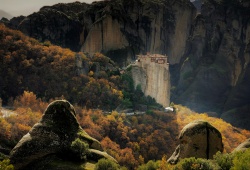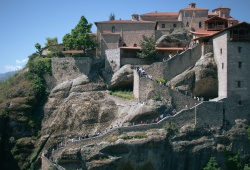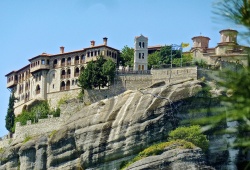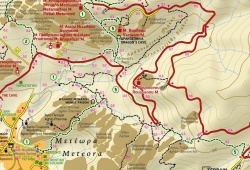Meteora
Nestled in the heart of Greece, the enchanting region of Meteora offers a unique and awe-inspiring experience for travelers. Known for its towering rock formations and monasteries perched atop them, Meteora is a destination that combines natural beauty, cultural heritage, and spiritual significance.
Meteora is renowned for its striking rock formations that seem to defy gravity. These towering pillars of rock, formed millions of years ago, create a surreal landscape that is unlike anything else in the world. The monolithic rocks, some reaching heights of over 600 meters, provide a breathtaking backdrop for exploration and photography. Hiking trails wind through the valleys, allowing visitors to immerse themselves in the natural beauty of the area. From the top of these rocks, one can enjoy panoramic views of the surrounding countryside, dotted with quaint villages and lush greenery.
Perched precariously on top of these rock formations are the famous monasteries of Meteora. Dating back to the 14th century, these monasteries were originally built as a refuge for monks seeking solitude and spiritual contemplation. Today, only six of the original twenty-four monasteries remain active, but they continue to be important religious sites and cultural treasures. Visitors can explore these monasteries, marvel at their intricate frescoes and Byzantine architecture, and gain insight into the lives of the monks who once inhabited them. The monasteries offer a glimpse into the rich history and religious traditions of Greece.
Meteora holds deep spiritual significance for many people. The word "Meteora" itself means "suspended in the air," and it is easy to see why. The monasteries perched on top of the rocks give a sense of otherworldliness and tranquility. For those seeking a spiritual experience, a visit to Meteora can be a transformative journey. The peaceful atmosphere, coupled with the stunning natural surroundings, creates the perfect setting for reflection and introspection. Many visitors find solace and inspiration in the serenity of Meteora.
A trip to to explore Meteora in Greece is an opportunity to immerse oneself in a world of natural wonders, ancient history, and spiritual enlightenment. The majestic rock formations and ancient monasteries create a unique and captivating atmosphere that is sure to leave a lasting impression.
►Explore the main villages of Meteora : Kalambaka, Kastraki.
How To Get There
The most convenient way to reach Meteora is by taking a bus from Athens, Thessaloniki, or other major cities in Greece. KTEL, the national bus network, operates regular services to Kalambaka, the town closest to Meteora. From Athens, the journey takes approximately 4-5 hours, while from Thessaloniki it takes around 3 hours. Buses are comfortable and equipped with air conditioning, making the trip pleasant and enjoyable.
Once you arrive in Kalambaka, you can easily reach Meteora by taking a local bus or a taxi. Local buses run frequently and have designated stops near the main monasteries. Alternatively, taxis are readily available at the bus station and offer a more flexible and personalized mode of transportation.
►View details, routes & bus tickets here
If you prefer traveling by train, Greece's national railway company, TrainOSE, operates regular services to Kalambaka. Trains depart from Athens and Thessaloniki, providing a scenic journey through the Greek countryside. The train ride from Athens takes approximately 5-6 hours, while from Thessaloniki it takes around 3-4 hours.
Upon arrival at Kalambaka train station, you can take a taxi or a local bus to reach Meteora. Taxis are usually waiting outside the station and offer a convenient option, especially if you have heavy luggage. Local buses also operate from the train station to Meteora, and the timetable is synchronized with the train arrivals.
►View routes, train tickets & timetables here
How To Get Around
Renting a car from Athens or traveling by car between Kalambaka and Kastraki, as well as the surrounding area, is the most practical way to move about Meteora. It is preferable to book a car in advance because there are no car rental agencies in Kalambaka. Taxis are available in taxi stations to get you to your destination quicker and easier. If you are interested in bus transportation, they serve different cities with Kalambaka via Trikala. Check routes & timetables here.



















